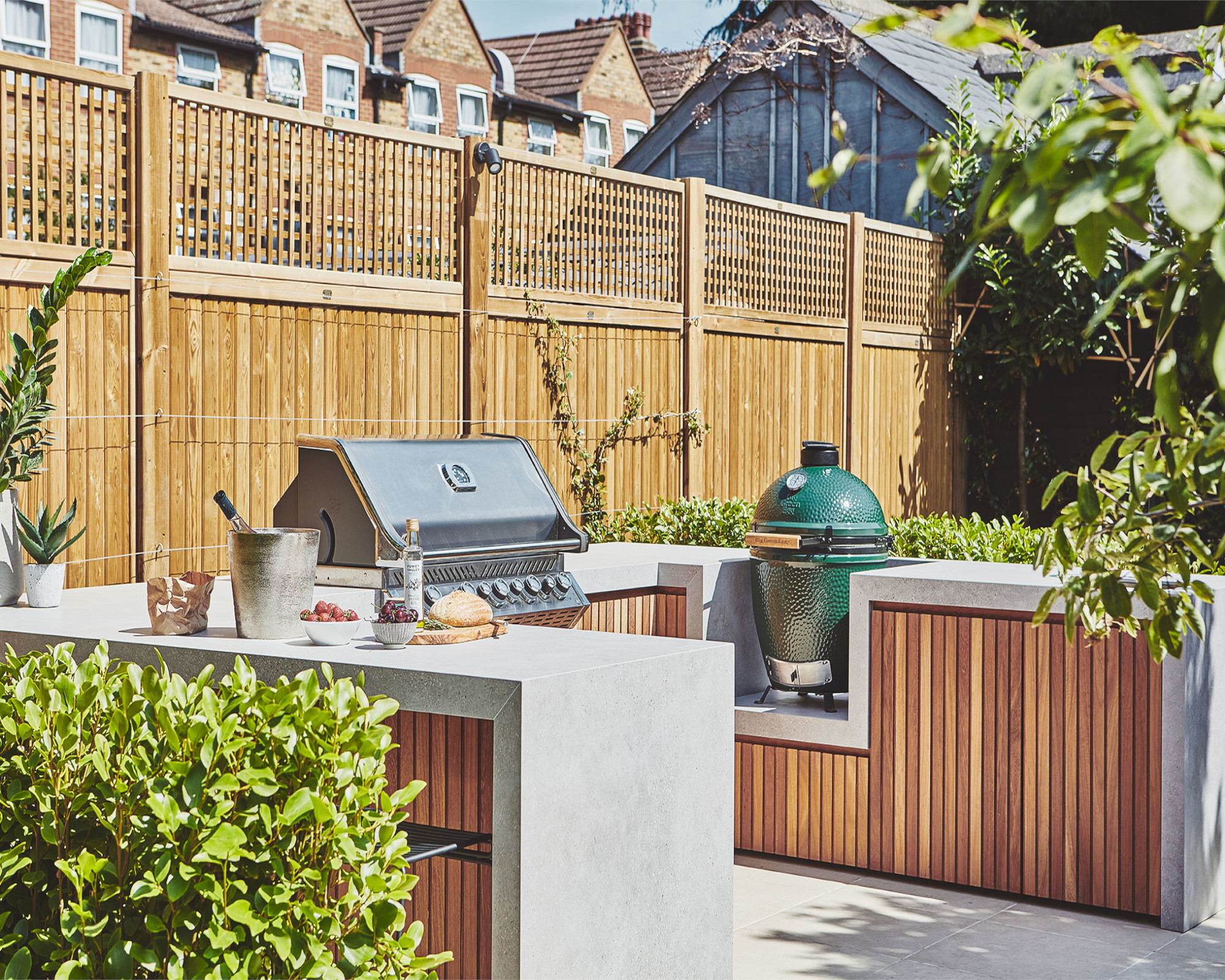Gas vs charcoal grills – which is the better buy for your backyard?
We weigh up the gas vs charcoal grill debate with help from some BBQ experts


Deciding between a gas and charcoal grill is the big decision when kitting out your outdoor space. If you're a BBQ expert, you'll undoubtedly have an opinion on which is best – but, for the uninitiated, deciding isn't so easy.
So which is better? The answer isn't so straightforward. Both gas and charcoal grills have their own pros and cons, each better suiting a particular type of alfresco chef. To decide which is the best grill for you, you need to know a bit more about how they work.
With that in mind, we grilled a few BBQ experts on the differences, plus asked them which type of grilling they prefer.
Experts on the pros and cons of gas vs charcoal grills
To understand which type of grill is best for you, you need to know that one type isn't inherently better than the other. It all depends on how you want to use it. 'Asking me which grilling method I personally prefer is like asking a grandparent which of their grandkids is the favorite,' says grilling enthusiast Paul Sidoriak of Grilling Montana.
To break down these differences, we asked the experts about four all-important areas - the ease of use, how easy each is to clean, the price and the taste of the food. Here's what they had to say.
Is there a difference in taste between gas and charcoal grills?
Food tastes better barbecued, right? That's the whole reason we've so invested in getting the right grill. But which type of grilling is the best for flavor?
'Both charcoal and gas fuels will bring additional flavor to grilled foods that are very hard to replicate on the stove or in the oven, so open fire grilling is already a flavorful advantage to other cooking methods,' says Paul Sidoriak. 'There’s a sweet spot between food that has been browned on a grill and food which has a bit of char to it.'
The Livingetc newsletters are your inside source for what’s shaping interiors now - and what’s next. Discover trend forecasts, smart style ideas, and curated shopping inspiration that brings design to life. Subscribe today and stay ahead of the curve.
'Gas grills will still give your food a slight smokey flavor but that isn't from the gas,' adds BBQ expert Michael Haas, founder of Angry BBQ. 'That smokey flavor comes from the rendered fat that drips onto the hot grill flavorizers. The fat will quickly burn off and emit some smoke which adds flavor to your food.'
When it comes to how to use a charcoal grill, the flavor potential is a lot higher. 'Grilling with charcoal provides flavor in 3 ways,' says Michael. '1. The same method as the gas grill when rendered fat burns off and emits smoke into your food. 2. Lit charcoal gives off a slight smokey flavor naturally. 3. You can easily add natural hardwood chips or chunks to your hot coals (oak, hickory, pecan, cherry) to provide even more smokey flavor to your food.'
Winner: charcoal
Which is easier to use?
Gas has the benefit of being incredibly simple to set up and use. 'You can easily control the temperature and consistently cook the same meal over and over,' says Shawn Hill, aka The Grilling Dad. 'If you're using a basic charcoal grill, you just don't have that level of temperature control.'
Michael Haas agrees on the convenience it provides. 'Gas grills can get to your desired temp very quickly,' he says. 'Depending on the size and make of your gas grill, you can get it to 450F in 5-10 minutes. Charcoal grills take 10-15 minutes just to get the charcoal lit and ready to dump into the grill. If you're tight on time, using a gas grill is the way to go.'
Gas grills are quicker to cool down too - you simply turn off the gas supply, where you need to choke charcoal of oxygen. 'Cooling down only takes 15-20 minutes on a gas grill, while cooling down typically takes me 25-45 minutes with charcoal, depending on the grill,' Michael says.
When it comes to perfecting your grilling process, gas grills usually offer a better set-up. 'Gas grills are also typically designed more ergonomically than charcoal grills,' says Paul Sidoriak of Grilling Montana. 'They are often at a comfortable countertop working height and have places to set down a tray of food, utensils, or a beverage while you're cooking.' Gas is also better for grilling in the rain or other inclement weather.
The one drawback to using gas? Being less aware when you're about to run out of gas. 'Although portable propane bottles are easy to exchange and have refilled, it’s incredibly inconvenient to do so if you run out in the middle of cooking,' says Paul.
Winner: gas
Are gas or charcoal grills easier to clean?
In general, cleaning both charcoal and gas grills is similar, however, each has its own steps which can make upkeep a challenge.
'If you've ever cooked with charcoal you'll notice how messy it is,' says Michael Haas of Angry BBQ. 'Charcoal is full of carbon and you'll get it all over your hands no matter how hard you try not to. Charcoal grills also have ash catch cans that need to be emptied on a regular basis. You never have to worry about these steps with a gas grill.'
Gas grills have extra components that require cleaning, however. 'Both charcoal and gas grills require a small amount of cleaning and consistent maintenance for optimal performance,' says Paul Sidoriak. 'This can be as simple as scooping out used ash from a previous cook, or emptying the built-in grease catch on a gas grill. But because charcoal grills have fewer internal components, they are easier to maintain than gas grills.'
Michael Haas agrees that in the long run, a gas grill needs more maintenance. 'A typical gas grill is constructed of the cooking chamber, grill grates, flavorizers, burners, igniters and some will have side burners or infrared burners,' he says. 'When I want to complete a thorough cleaning of my gas grill, the disassembly takes considerably more time than my charcoal grills. You also need special tools to clean the burner tubes properly. Overall charcoal grills are less upkeep and maintenance.'
Winner: charcoal (narrowly)
Which is more expensive?
The best gas grills can get pricey, while charcoal grills have a wider price range, catering for low and high budgets. 'A Weber Kettle charcoal grill from Amazon is a relatively inexpensive grill to purchase,' suggests Michael Haas. 'You can get into the grilling game for under $150.'
Winner: charcoal
Which is better, a gas or charcoal grill?
There are a few other considerations to bear in mind before making your decision. Gas, for example, doesn't double up as well as a smoker.
'Smoking meat on a gas grill isn't ideal, while charcoal grills allow you to smoke food easily,' says Michael Haas. 'Charcoal grills can operate at low temps for a very long period and if you want to add extra smoke flavor to your food, simply throw some hardwood chunks onto the coals.'
'You also have to purchase special wood smoker kits that hold wood and sit above a burner to get any smoke emitting on your gas grill. I find these devices somewhat of a gimmick and I tend to stay away from them,' he adds.
Truly, the decision on gas vs charcoal grills is down to a personal choice. Gas grills are efficient and easy to use, while charcoal grills require a little more craft, but may be judged as worth the time and effort.
'If it's up to me, I'm using charcoal,' says Shawn Hill of The Grilling Dad. 'Not only do I prefer the flavor, I thoroughly enjoy the entire process of getting the coals lit, adjusting the dampers to get the perfect temp, and the smells that are as nostalgic as anything else from my childhood.'
'Given the opportunity to spend some time building a fire and adjusting airflow, I will take a charcoal grill almost any day over gas, echoes Paul Sidoriak. 'It may be partially psychological, but there’s something about a charcoal grill that ignites all the senses. I’m certainly guilty of spending 45 minutes getting the charcoal perfect just to cook a burger or steak in under 5 minutes.'
'If I was stuck on an island and I could only have one grill, I would take my charcoal grill,' says Michael Haas. 'As I get older, taste trumps convenience.'
So there you have it, three out of three experts would opt for the best charcoal grill when forced. But, bear in mind that there are some great combo grills out there that include room for both cooking methods, meaning you can get the best of both worlds.

Hugh is Livingetc.com’s editor. With 8 years in the interiors industry under his belt, he has the nose for what people want to know about re-decorating their homes. He prides himself as an expert trend forecaster, visiting design fairs, showrooms and keeping an eye out for emerging designers to hone his eye. He joined Livingetc back in 2022 as a content editor, as a long-time reader of the print magazine, before becoming its online editor. Hugh has previously spent time as an editor for a kitchen and bathroom magazine, and has written for “hands-on” home brands such as Homebuilding & Renovating and Grand Designs magazine, so his knowledge of what it takes to create a home goes beyond the surface, too. Though not a trained interior designer, Hugh has cut his design teeth by managing several major interior design projects to date, each for private clients. He's also a keen DIYer — he's done everything from laying his own patio and building an integrated cooker hood from scratch, to undertaking plenty of creative IKEA hacks to help achieve the luxurious look he loves in design, when his budget doesn't always stretch that far.